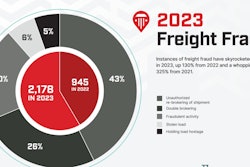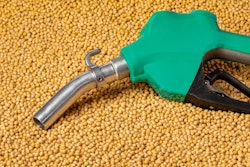Truckers' days of finding relatively cheap diesel fuel in the Midwest may be numbered, as a $22 billion "catastrophic boondoggle" of a pipeline expansion north of the border threatens to end the U.S. stranglehold on cheap crude oil from the Canadian province of Alberta.
The inland province produces a lot of heavy crude, the kind that's used to make diesel fuel. Since the 1950s, the Trans Mountain pipeline has shipped that south. Over the last few decades, the U.S. has become increasingly reliant on Canadian crude exports from the pipeline.
[Related: Why is diesel getting so much more expensive than gasoline?]
"Currently, nearly all the oil produced in Western Canada goes to one market, the United States Midwest," the Trans Mountain website reads. "However, there’s a limit to how much oil this market needs. For much of the last decade, Canada has been selling into the United States at a discount to the world price for similar oil products."
This discount reaches as much as 23 cents/gal. in the Great Lakes and 41 cents/gal. in the Great Plains region, according to Tracy Shuchart, global energy and materials strategist at Hedge Fund Telemetry Geopolitics. Any big boost in U.S. diesel prices across the country's midsection could be especially painful. Typically, the Midwest represents one of the cheaper diesel markets, often bested only by the Gulf Coast region in the Energy Information Administration's weekly oil and fuel price reports.
Now, the Trans Mountain expansion nears completion, despite years of setbacks and budget overruns. The Midwest's discount will narrow, but not completely go away, according to Shuchart.
 Map shows the Trans Mountain pipeline, which already connects to the Pacific, but the expansion, which is 95% done, will almost triple output from 300,000 barrels per day to 890,000.EIA
Map shows the Trans Mountain pipeline, which already connects to the Pacific, but the expansion, which is 95% done, will almost triple output from 300,000 barrels per day to 890,000.EIA
"The simple truth is that Canada’s oil will fetch a better price if we give ourselves the option of shipping more of it via Trans Mountain’s Pacific tidewater terminal in Burrard Inlet" in Vancouver, wrote Trans Mountain. "Canada will earn more on every barrel of oil that’s piped west compared to those sold to our existing customers in the United States Midwest market, a differential that exists regardless of the price of oil."
Shuchart feels it's "definitely going to be a problem for the U.S.," she said. "There’s not that many places to get heavy crude oil as cheap as we get it from Canada." The only other real "choices are Columbia and Ecuador, and that's a lot higher price, which will put a dent into refining margins."
[Related: Highly incentivized renewable diesel impacting supply of conventional fuel]
With higher costs and lower margins for refiners, "that can lead to obviously higher diesel prices," she said, as refiners "pass those onto the customer."
At once, it could be some time before the pipeline expansion is complete -- diesel pricing isn't expected to be impacted before then. Delays have been frequent to date, Shuchart said. Currently, the Canadian government predicts completing the pipeline expansion by the end of the first quarter of this year, but it's been wrong before.











